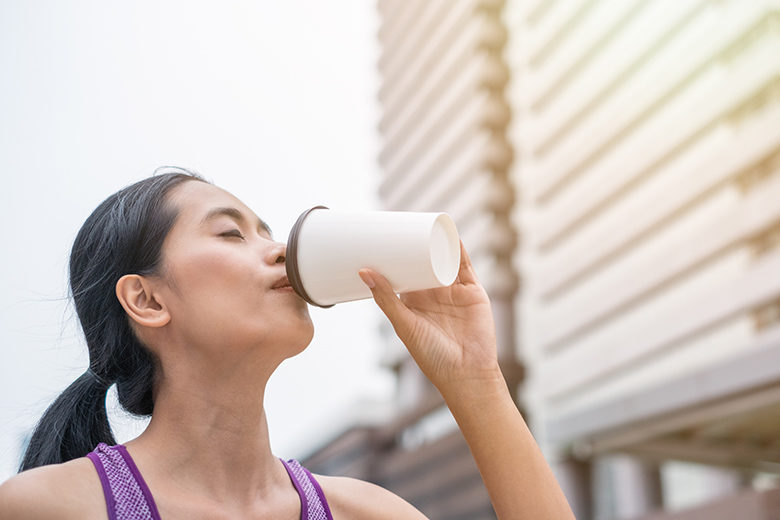
Common liquids such as coffee, green tea and medium-chain triglycerides (MCT) oil have gained attention as performance enhancers that can improve body composition, but can these beverages deliver proven results?
Coffee’s potentially beneficial component is the caffeine itself, which is ergogenic for athletic endurance and has been shown to be highly effective without risk of fluid imbalance due to its diuretic effect. Studies show that caffeine can increase performance in athletes anywhere from 5-25 percent. The recommendation suggests that 5 mg of caffeine per kilogram of body weight, one hour prior to exercise, can increase endurance performance. For best results, have a cup or two of coffee before you work out; though levels in coffee vary, a 16-ounce cup contains approximately 100 mg of caffeine. Finally, keep in mind that the more caffeine ingested on a daily basis, the lower the response in taking it for performance purposes.
Green tea is also used for cognitive performance and mental alertness as well as touted for its antioxidant and potential weight loss properties. An 8-ounce cup of green tea contains 10-80 mg of caffeine as well as catechin polyphenols, an antioxidant that may be beneficial for increasing energy expenditure and thermogenesis. Green tea has been shown to potentially aid in fat loss as well as help recover from the stress of strenuous physical activity due to its antioxidant capacity. Studies show that green tea in supplement form (90 mg) can be beneficial for fat loss when taken in conjunction with caffeine (50mg) up to three times daily. To gain the dual benefit of caffeine plus antioxidants, drink one to three cups of green tea daily.
Medium Chain Triglycerides (MCTs) are used for nutritional support in athletic training, with potential to decrease body fat and increase lean muscle mass, though most studies report more research is needed to verify these effects. You will notice MCT oil popping up in grocery and health food stores; it is a clear, liquid oil without a significant color, odor or taste. MCTs are made from hydrolyzed coconut or palm kernel oils that are readily oxidized in the liver. Unlike dietary long chain triglycerides, MCTs do not require bile salts or the intestinal lymphatic system for absorption and digestion, and are often used medically for patients who malabsorb traditional fats, to reduce triglyceride levels and for treatment of Alzheimer’s disease. Studies remain mixed as to whether MCTs can be an effective source of fat during exercise metabolism and/or improve performance. Similarly to green tea, MCTs may have potential for raising resting energy expenditure and metabolic rate. Further, consuming MCTs is satiating, which may decrease caloric intake overall. Studies generally indicate one to five tablespoons per day can be beneficial.
Keep in mind that all these beverages can have negative side effects, some severe, if used incorrectly, combined with other medications or if you have pre-existing medical conditions. Do your research and talk to your doctor if you have concerns.
References:
- American College of Sports Medicine. Caffeine and Exercise Performance.
- Goldstein ER et all. International society of sports nutrition position stand: caffeine and performance. J Int Soc Sports Nut. 2010;27(1):5.
- International Olympic Committee
- Kolata, G. "It’s Time to Make a Coffee Run." Published 3/25/09.
- Kreider RB et al. ISSN Exercise and Sport Nutrition Review: Research and Recommendations. J Int Soc Sports Nutr. 2004;1(1):1-44.
- Natural Medicines Comprehensive Database
- Senchina DS, Bermon S, Stear SJ, Burke LM, Castell LM. BJSM reviews: A-Z of nutritional supplements: dietary supplements, sports nutrition foods and ergogenic aids for health and performance. Br J Sports Med 2011;45:150-151.
- St-Onge, M.P., and Jones, P.J.H., 2002. Physiological effects of medium-chain triglycerides: potential agents in the prevention of obesity. J Nut 2002:132(3):329-332.





